How to Choose the Right eCommerce Platform for Building Your Online Marketplace
According to McKinsey research, 12 percent of the global goods trade is conducted via international e-commerce, with much of it driven by virtual marketplaces such as Alibaba, Amazon, eBay, or Flipkart.
The research shows that the “population” of the leading online marketplaces is bigger or equal to the world largest countries:
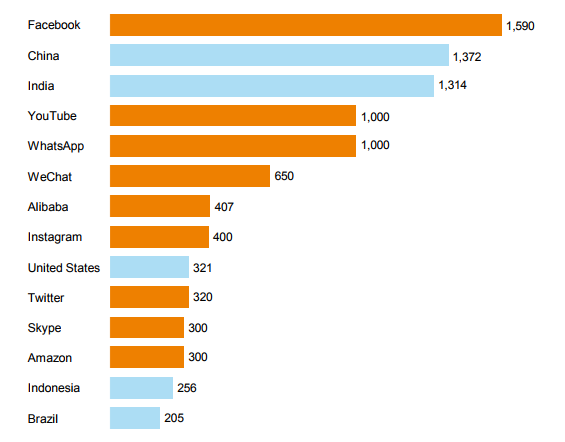
For such a significant amount of people, a good infrastructure is a must in any country. For a marketplace website, the infrastructure is enabled by a multi vendor platform it’s built on.
If you are a fresher with few dozens of sellers on board, the online marketplace platform you choose will have similar significance, since the modern virtual malls grow fast, and the workload and needs increase accordingly.
For example, one of India’s top web marketplaces ShopClues was founded in 2011, was named the Coolest Startup of India in 2015 and had joined the “billion-dollar club” in 2016.
While an online market platform doesn’t influence the planning stage—audience defining and a marketplace idea verification, it means everything a virtual mall must possess to succeed when you jump into the action part and start interacting with customers, collaborating with sellers and developing the marketplace.
That’s why the best way to choose the right multi vendor shopping cart software is to consider its characteristics and functionality through the prism of how good it fits your online marketplace daily and long-term goals and challenges:
- marketplace management;
- vendors’ collaboration and retention;
- customers’ acquisition and satisfaction;
- business development.
You may also be interested:
multi vendor marketplace software
1. Choosing the Multi Vendor Platform—a Marketplace Needs and Challenges First
1.1 Marketplace Management
The very process of launching and using an online market platform should be simple and intuitive, preferably with no programming knowledge required.
A good multi vendor shopping cart software provides the ability to control everything from the admin panel: vendors, orders, income, payouts, and a marketplace design.
A marketplace owner or administrator should be able to check, approve and moderate all vendors’ data quickly.
Besides, it’s necessary to pay special attention if a multi vendor ecommerce script allows you to verify the listed products in a fast and convenient way.
Even though at the beginning it can be just a few hundreds of products listed on your virtual mall, marketplaces grow fast and you’ll soon find yourself being the manager of the whole eBay, trying to verify tens of thousands of goods.
Bulk product editing and listing is another essential function for shopping mall admins and sellers. For example, if an online marketplace platform allows you to tag in bulk of thousands of goods with “out of stock” in a few clicks, it will save your virtual mall admins and sellers lots of time.
Payouts management is the hardest part of online marketplace administration. You need to handle commissions and payments distribution to sellers every day.
The best way to cover this task is to have both automatic and manual payout functionality enabled by platform. Then payouts are divided between sellers automatically via a built-in platform functionality, and you can make a manual payment if you need it for some special occasion.
Amazon explains this feature to sellers in details:
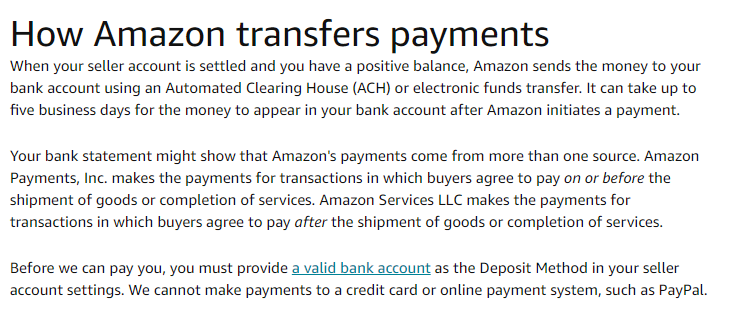
An online marketplace is like a huge digital warehouse of goods, that’s why an advanced search functionality to locate products easily and quickly is a must.
It’s good if a multi vendor script goes even further and allows you to find items via category, order, customer, vendor and other parameters—to save sellers’ time and increase customers’ satisfaction.
1.2 Vendors Collaboration and Retention
The whole workflow should be transparent and simple for sellers: approving application form, orders processing, commissions and payouts defined by a clear procedure.
Regarding payouts—the best is when an online market platform provides few editable built-in commission models for you, just to pick the most suitable ones for your sellers.
It can be a commission out of each transaction within your web marketplace or vendor plans with various conditions for each of the seller-type your shopping mall has.
This helps to maintain trust between you and sellers—they know they can always find a payment model that matches their average sales amount and other needs, and all the models are transparent and clear.
Amazon vendor plans:
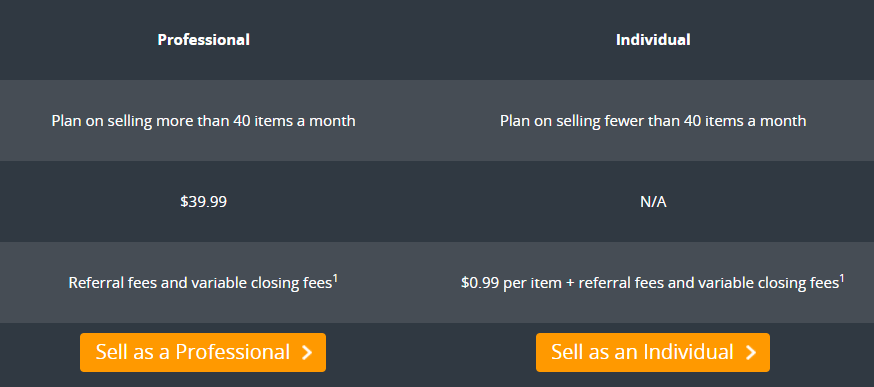
The functionality that enables the extended capabilities for online vendors helps to acquire and retain even experienced sellers who have established their reputation and customer base already.
It can be mini-shops for each seller within an online marketplace, where they can change the design, select products, manage orders, choose methods of shipping and payment.
Some multi vendor scripts provide the ability to have rich product filters and a search bar for each vendor shop as well.
The Yumbles filters:

Independent dashboard with sales reports and analytics for each seller is also an important feature that helps sellers analyse and improve sales deeply.
You can help your sellers start selling new products by adding new product categories, if a multi vendor platform provides this functionality.
Adding many categories is one of the ways most of the modern leading marketplaces got to the top—like eBay:
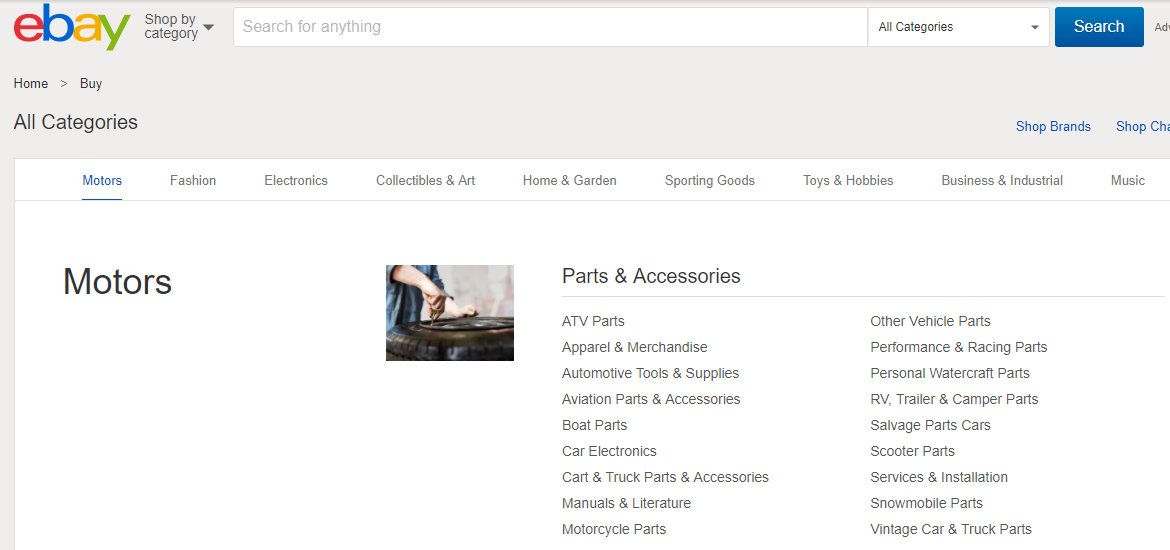
A great multi vendor shopping cart software offers different tools for sellers to improve their engagement with their customers—they can add polls, product videos, loyalty programs.
Amazon is leveraging this feature in a great manner:

If your virtual shopping mall works with inexperienced sellers a lot, then efficient onboarding process and learning is important.
In this case, the tool that enables access to each vendor dashboard would help to demonstrate all the features of the web marketplace to each online vendor for them to learn and start selling quickly.
Some online marketplace platforms provide a storefront built directly on social media pages. Together with the synchronization feature to export your goods to the biggest world shopping malls, those tools also significantly increase sales and boost traffic.
ShopClues utilizes this feature:

Terms and conditions for each online vendor or category is another useful feature that helps to minimize the number of dissatisfied customers, and allows sellers to communicate their own rules in regards to cancellations, defective goods, and product usage:
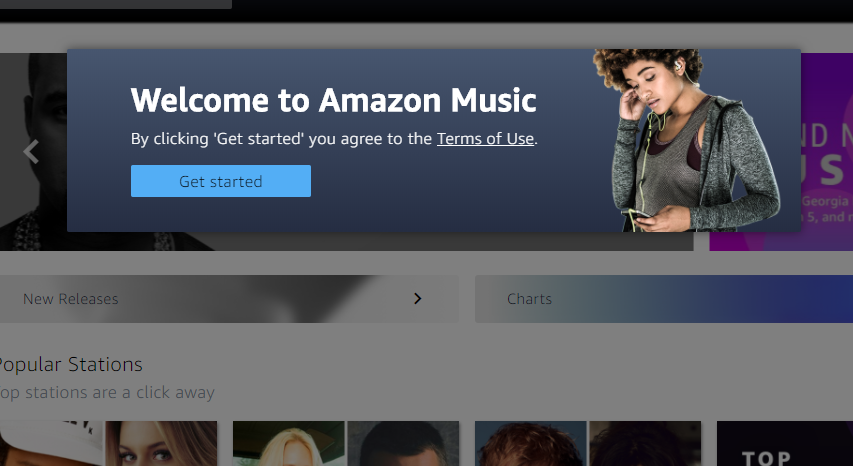
1.3 Customers’ Acquisition and Satisfaction
The main multi vendor platform features for customers should be focused on helping them navigate quickly through the Internet marketplace, find items easily and be able to choose the right seller.OrdersFor example, if customers order from different vendors, shipping costs should be calculated separately—and a customer pays for only one order.
A multi vendor eCommerce script should enable alternative ways to make an order as well—for example on Amazon, buying in just one click.
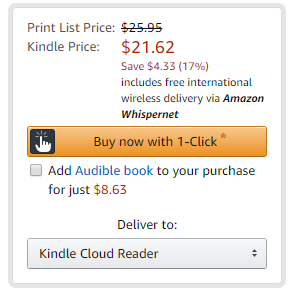
Rankings and reviews help customers make a more informed choice among sellers.
Amazon customer reviews:
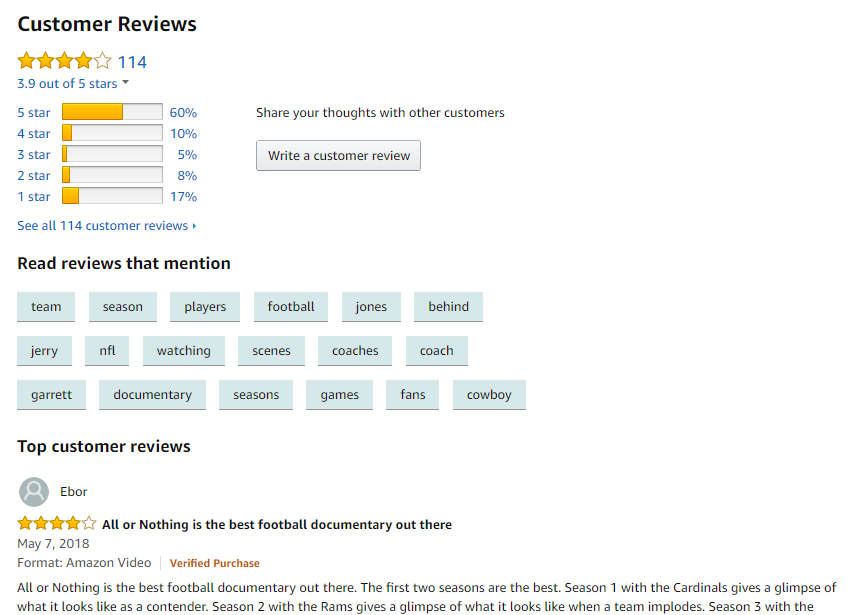
Payment
Payment security and convenience are one of the most crucial features an online market platform should provide. Different payment methods including the most popular and safest options embedded in a multi vendor script give you less concern about integrating a third-party payment gateway.
The best is if a multi vendor platform lets you to meet all the online payment security requirements and ensures customer financial data protection as well.
Search
Another important feature is search technologies for customers to find goods with minimum effort from their side.
A good search functionality includes search suggestions, relevant products, categories and pages, when a customer starts typing—like on Amazon:
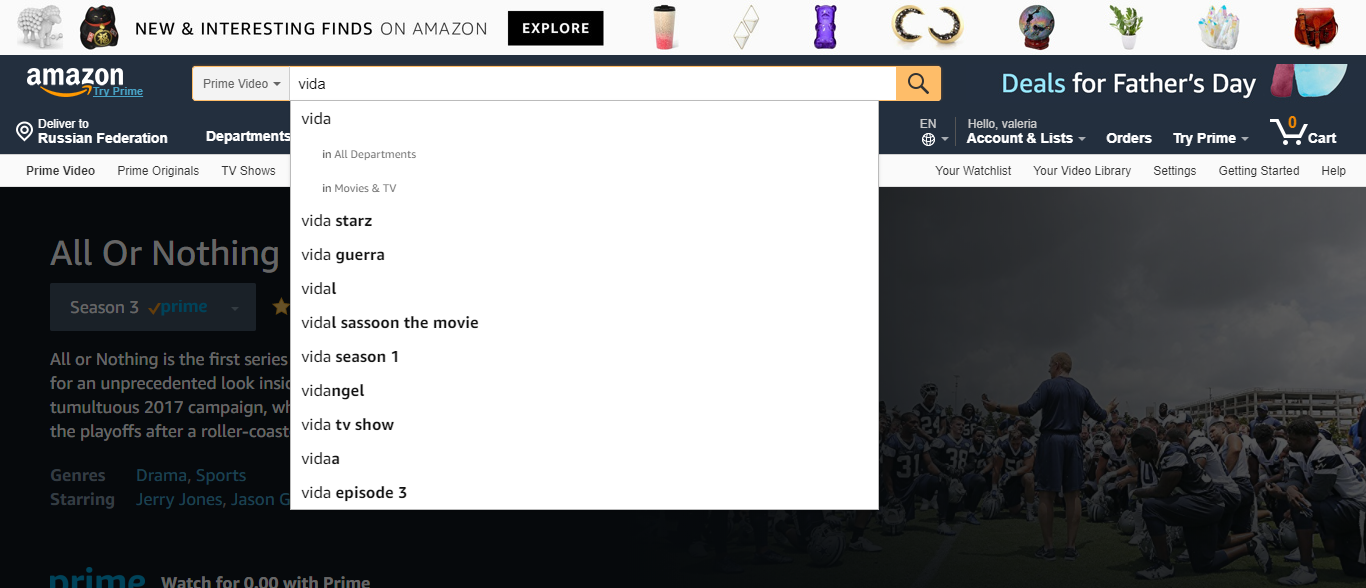
1.4 Business Development
It’s impossible to run a successful virtual marketplace without in-depth analysis based on statistics and reports.
Thus, a online marketplace platform system should be integrated with the most efficient and popular tools like Google Analytics—to track traffic and have detailed sales statistics.
Mobile Buyers
ComScore reported that mobile commerce had grown to 45 percent in 2016.
In The State of the U.S. Mobile Market it shows that m-commerce growth is outpacing e-Commerce:
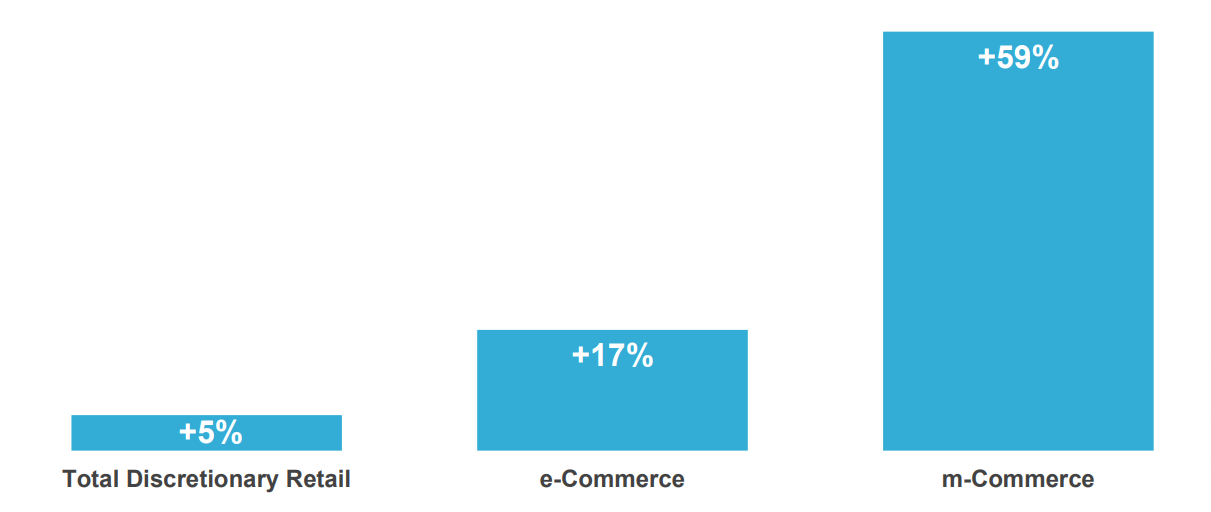
Thus, this is the important characteristic of any multi vendor ecommerce script if it provides a responsive design—for a web marketplace to look flawless on any device.
Besides, this feature helps a virtual mall get higher Google rankings and embrace customers that search for goods via smartphones.
Moreover, great modern online market platforms provide virtual malls with the ability to create its own mobile app, that is fully synced with a desktop marketplace and has the same payment and search tools for clients.
This feature would help you embrace the increasingly growing market of mobile buyers:
Amazon mobile app:
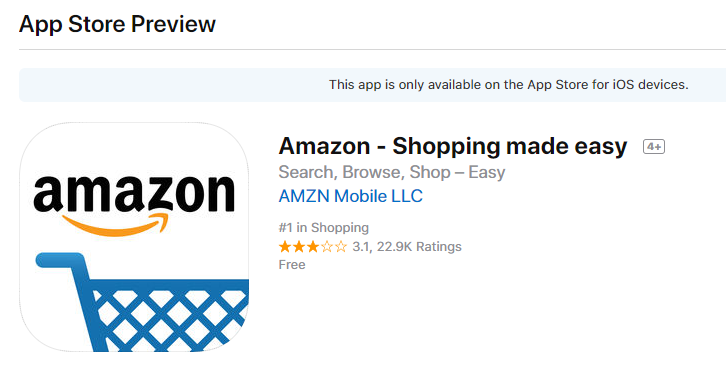
ShopClues uses an app for its sellers to manage orders anytime and anywhere and to provide great customer service through a real-time chat and other on-the-go features.
Marketing and Promotion Features
Marketing features are the main pillar of any platform functionality intended for marketplace development and promotion.
As Yumbles marketplace shows, It enables various bonuses and discounts for customers, and cross-selling tools to increase the average bill:

Amazon cross-selling tools:
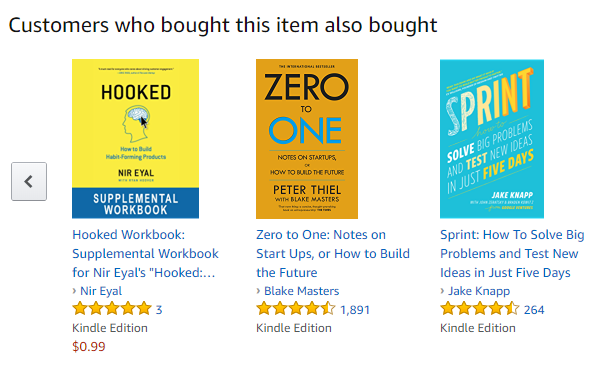
As Yumbles demonstrates, email-marketing is also important to engage customers:

It’s the ideal instrument to overcome one of the most crucial issues of modern virtual marketplaces—abandoned carts.
Together with keeping personal lists of products that online store visitors left in their carts, sending efficient email-reminders helps to turn abandoned carts into purchases.
To boost organic traffic, a multi vendor shopping cart software can provide many tools as well: integration with shopping directories like Google Product Search, SEO-instruments, and a marketplace blog.
While those parameters are important in any marketplace, there are few things to keep in mind in connection with your individual marketplace business model when choosing the platform.
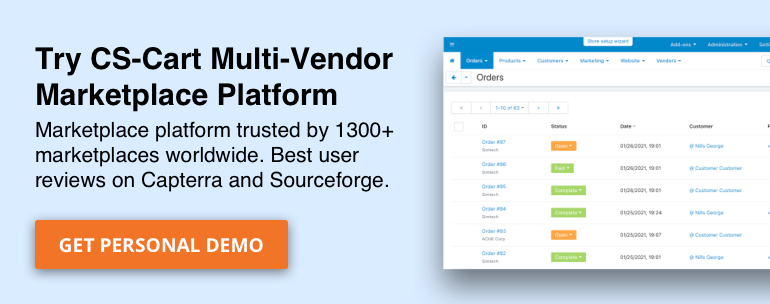
True Experience #1

Ajay Bavle, CEO at SugarPlate, the bakery marketplace

— Well hello, Ajay. Got some questions for you. Do you think the software platform matters for creating a successful eCommerce marketplace?
Yes, the proper choice of a platform is critical for a successful eCommerce marketplace. For our marketplace Sugarplate, we evaluated various platforms and decided on CS-Cart Multi-Vendor based on the following criteria:
- Pricing and licensing model
- Open and configurable source code
- Ability to customize and ease of integrating add-ons
- Support for bug fixes
- Flexible and robust payment systems (we use a 3-way payment system, as it suits best our business model).
— What type of platform does suit better an online marketplace: hosted or SaaS?
A hosted platform suits better than a SaaS simply because of the full feature set that is available for immediate testing and implementation. There are no “premium” features that require extra payment.
With hosted, the pricing is upfront and there are no monthly subscription fees.
The greatest benefit we’ve seen with a hosted open source solution like CS-Cart Multi-Vendor is the limitless possibility of customization. Our business is unique in many ways: it is local area based, deals with perishable food items, products must be made available on an exact date, etc. and this required large number of customizations. This would not have been possible on a SaaS based platform.
— What are the main features a marketplace software platform must have out of the box?
a. A marketplace software platform must have a very robust and configurable payments handling system to cater to a wide variety of products and services.
For example,
- choosing who pays the credit card processing fees,
- can it accept partial payments before goods/services are delivered,
- can it integrate with large bank’s APIs to accept payment from buyer and send payment to vendors (minus commission).
Our business Sugarplate is an online marketplace for local bakeries, and in this area of business, it is common to have an initial deposit and then payment in full at the time of delivery. Currently, there is no way to accept a partial payment.
b. Sales taxes for online businesses is being hotly debated in the US and every small marketplace business must err on the side of caution. That means the platform should handle sales taxes through a real-time library, for a variety of products/services, which would allow the business to collect appropriate sales taxes on a transaction.
2. A Marketplace Unique Business Model and a Multi Vendor Platform Selection—Searching for a Perfect Match
Your unique web marketplace idea is influencing the type of a multi vendor script that would be the right one for your online marketplace. The following elements among others should be considered:
- a marketplace business model and plans for growth: global/national expansion, horizontal or vertical marketplace type;
- marketplace vendors and customers’ specifics: physical, digital goods, a service marketplace, B2B marketplace, B2C, C2C seller-customer interaction format.
2.1 Geographic Region
If you plan to collaborate with vendors from different countries, it’s necessary to pay special attention to a online market platform built-in translations.
Besides, multi-language feature helps local customers from different regions buy from your marketplace.
Amazon language tools:
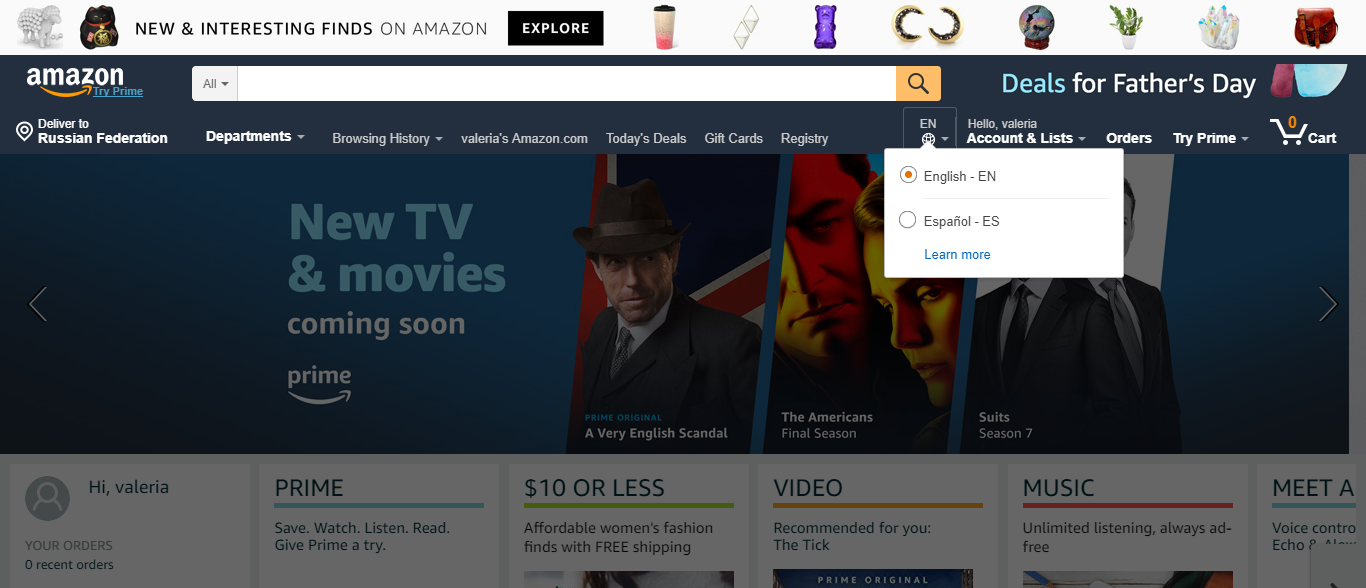
Ability to use local currencies and taxes built-in to a multi vendor ecommerce script is also highly desirable in this case.
2.2 Physical Product Marketplace
Since a web marketplace with physical goods is required to deliver purchases to customers, one of the most important features for such a shopping mall is integrated shipping methods provided by the most trusted shipping carriers.
Another important feature is automatic shipping cost calculation—for sellers not to specify the shipping cost for each product manually.
Besides, it is good if a multi vendor shopping cart software provides the ability to set custom shipping methods, especially if your virtual marketplace operates on a national or global level. This gives your sellers more flexibility to set up shipping charges based on the location, cost, weight or other parameters, and it’s much more convenient for customers as well.
Dropshipping feature allows you to showcase the goods in the store but not to keep them in stock. This helps to collaborate with wholesalers and sellers-newcomers who don’t have their own warehouses yet.
Returns management tool is also important for physical products—ensure that the online marketplace platform enables a smooth refund procedure for both vendor and customer, and lets you control and analyze the total number of returns to track business development tendencies.
2.3 Digital Goods and Services Marketplace
If you run a marketplace website with digital goods—e-books, pictures, MP3—the sales funnel for those products is usually longer than physical products.
Thus, it’s necessary to have strong marketing tools enabled by a multi vendor platform to run such a web marketplace successfully.
These tools are also inevitable for a service marketplace.
Another feature for a virtual service mall is the ability to create a virtual marketplace and a social network at the same time to establish customers’ community around the marketplace—as on Yumbles:

Additional tools to set up pricing that matches digital goods is also a must.
For example, Amazon does not only allow you to purchase, but also allows you to rent its digital products:
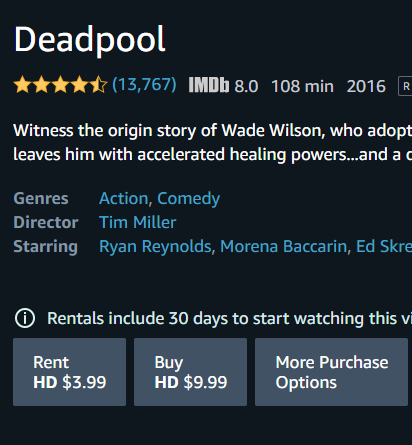
Also, a multi vendor ecommerce script for digital goods or services should provide a special procedure for orders delivery.
It can be an email with a link to the digital file, or the ability to set up a period of purchased digital product availability.

True Experience #2
Harm Smits, Lead Developer at PoppedWeb—eCommerce company from Netherlands that helps to start up, support, and develop online businesses: “Your software platform should be more than excellent”

— Harm, do you think the software platform matters for creating a successful eCommerce marketplace?
The software platform of an eCommerce marketplace is like the spinal cord, it is the system which brings information from point A to point B. For example, if the spinal cord fails, you are in big trouble, hence your software platform should be more than excellent. There are also a lot of other factors which one might consider when deciding what platform to use, some of these are very straight forward but some remain unanswered till it is too late, such as a good partner who can always provide support when necessary and the overall stability of the platform.
— What’s the best choice for an online marketplace: a hosted or SaaS platform?
In our professional opinion, hosted is the best solution. It allows you to create a truly unique store with unique functionality and it gives you some slack for customization which might be required for your store. Also, your costs can turn out to be way less since most SaaS solutions bill you by the amount of products / orders / emails sent / etc. whilst hosted allows you to add as many products as you desire.
— What are the main features a marketplace software platform must have out of the box?
This is very hard to say since the requirements for each marketplace software platform are different and because the concept main features is very broad. In our opinion one should look at what they want to do and what they need to do it. A large marketplace will need a platform which allows multiple servers to communicate with each other by using a database layer (which is often not provided out of the box) whilst a smaller store will need merely a lightweight solution. For these decisions it is best to contact an experienced reseller who is capable of giving you a solid recommendation.
3. Online Market Platform Research and Selection—What Else to Consider
3.1 Types of Multi Vendor Platforms
An ecommerce platform type is not just a software classification. The experience you have with a multi vendor script, costs and time needed to build a web marketplace often depends on it.
The following attributes of online marketplace platforms ranges:
By purpose:
- eCommerce and marketplace solutions: shopping cart software solutions created specifically for online shops and marketplaces. It’s easy to use them without the help of technical specialists since they are initially made to fit all the virtual shopping mall needs. It’s a cost-effective solution since it needs a minimum of extensions;
- multipurpose platforms: intended for everything: corporate website, social networks creation, and can be used as an e-commerce platform solely by special plugins and extensions addition.
By software type:
- open-source: the source code is released openly, and enables higher flexibility since it’s possible to adapt the multi vendor scripts’ code to your individual needs;
- proprietary platforms: changes in the code are restricted by a license, so building new features with your developers isn’t possible.
By functionality:
- built from scratch: created from scratch, including all the functionality that pre-packaged solutions have by default. The main advantage is high customization, but programming even a simple virtual marketplace from scratch is difficult because it’s a multi-sided online market platform with monetary transactions, so it’s expensive and takes a lot of time;
- pre-packaged: has the basic features in a pre-built version; to tweak a pre-built platform for a marketplace needs is much cheaper than building an ecommerce software solution from scratch.
A multi vendor shopping cart software can match the few attributes at the same time. It can be pre-packaged and proprietary, so it fits the fundamental marketplace needs but can’t be customized further. It can also be an open-source solution, intended specifically for e-commerce—the optimal solution for a marketplace.
3.2 Support from a Platform Provider
Make sure a multi vendor ecommerce script is supported by an active community of users and technical specialists.
Within a community, try to find out about the ease of use, upgrades, basic functionality and extensibility.
Besides, technical support quality, updates frequency and bag fixing policies are the important markers.
A free trial version availability is also essential. If it enables access to full functionality, you can gain hands-on experience, check the online marketplace platform in action and evaluate if it fits your web shopping mall needs.
3.3 Costs
Choosing a multi vendor script for a marketplace, it’s necessary to consider all the costs it entails, not just the platform price.
There are three key areas that impact pricing:
- customization needs: while using a multi-purpose platform, the biggest part of costs will be to customize functionality to a shopping mall purposes, and the customization process usually lasts in few years after a web marketplace starts working;
- a basic (pre-packaged) version functionality: if it contains all the necessary features for an online marketplace by default, future extensions will cost much less, but if a basic version only has minimum set of features, expenses are going to be similar to a multi-purpose customization costs;
- associated costs: hosting and security.
3.4 Technical Characteristics
There are few technical parameters that influence a marketplace flawless work:
- functionality extension method: extension through modules is the best approach for a multi vendor platform intended for marketplaces: new features can be adopted step by step, with no risks of work failure for a whole marketplace, that can happen if you extend functionality by altering the core of a multi vendor shopping cart software;
- hosting: a online market platform provider can offer hosting or detailed information regarding hosting requirements—hosting influences the speed of work and pages loading, that is vitally important for marketplaces.

True Experience #3

Gaurav Gupta, Director at Onjection Labs—eCommerce store and marketplace development company

— Hi, Gaurav! Do you think the software platform matters for creating a successful eCommerce marketplace? Why?
Yes, it really matters. There are 3 ways:
1. You can build it from scratch.
2. You can build it using some open source CMS with 3rd party marketplace add-ons.
3. Or you can use an already built full fledged multi-vendor system and can customize it or build on top of it.
I will always prefer the 3rd one. Because building it from scratch is like re-inventing the wheel, which I personally don’t feel the right approach to do so. It involves a lot of time and cost as well.
For 2nd there are a lot of compatibility issues when it comes to starting with 3rd party add-ons for a marketplace.
So its always wise to choose a platform with its core as marketplace, lesser compatibility issues, good turnaround time with lesser cost.
— What type of platform does suit better for an online marketplace: hosted or SaaS? Why?
I would always suggest to go for hosted when it comes to a marketplace, because all the marketplaces are highly customized websites.
So when it comes to build a customized eCommerce website I will always prefer a hosted solution rather than a SaaS-based solution. Because with a SaaS-based one you always have to live on the mercy of add-ons or plugins as you can customize the platform to a very limited scope.
— What are the main features a marketplace software platform must have out of the box?
Marketplace features can be different as per needs, but there is something common which I guess most of the marketplaces need. For example:
- Robust product management system. Ability for vendors to create products from the existing portfolio. Ability for vendors to create new products that can be approved or disapproved by admin team.
- Vendor KYC. Most countries like India is required to have Vendor KYC done, as it avoids later compliance issues. For example whether the seller is an individual or a company, so you need to collect documents on the basis of that. Ability to approve vendor accounts only after the verification of the documents and the information provided.
- Order management system. As in marketplaces single order can have products from different sellers, it’s always advised to break such orders into suborder ids. This way it’s easier to assign orders to respective sellers and it leads to better accountability in the system as well.
- Advanced vendor panels. Vendors need to be able to manage products, process orders, and ship them directly from the panel. Vendors need to be able to see commissions of the categories they are into. Things like expected payouts, payouts done in the past really matter.
- Vendor reviews. Vendor reviews are very important especially when you are showing multiple options to choose from on the product page. Reviews from past 30 days or 90 days can really help customers choose wisely.
- Accounting & vendor payouts. Accounting is really important. System should take into account how much business has been done, what are the expected payouts for vendors. What are all the taxes, input credits etc. Admin can set the commission type for each category or they can also charge a flat fee for every product sold. All things should also reflect in the accounting as well.
True Experience #4

Robert Diak, the Head of eCommerce development company CS-Cart.pl that develops add-ons and modifications for CS-Cart and CS-Cart Multi-Vendor

— So, Robert, what about you? Do you think the shopping cart software matters for a solid eCommerce marketplace?
Yes, definitely.
You really depend on the platform on which you create a business. Our experience shows that people who have other platforms that have stopped meeting their expectations (no development, no new interesting features) are going for the CS-Cart Multi-Vendor platform. So they have exhausted the possibilities on the old platform and expect that the new one will allow them to develop their business.
For example, the promotion module is such a feature that attracts customers to the CS-Cart Multi-Vendor platform.
— What’s better for an online mall—a hosted software or a SaaS solution?
Hosted, of course. Three yes for hosted:
- The ability to make your own modifications
- Adapting the program to your own needs
- The ability to implement your own original ideas
— What 3 main features a marketplace software platform must have to your opinion?
- Easy installation
- Easy configuration in a few steps
- Easy management of basic settings
~
Conclusion
When choosing a marketplace platform, the best is to stick to the virtual mall most important needs and challenges, and your unique marketplace idea and business model and check if a multi vendor script fits them.
At the same time, it’s necessary to keep in mind that a platform technical characteristics and type influence the process of the web marketplace building, launching and flawless everyday work significantly.
While you can gather all that information from communities and testimonials, walking from website to website with a functionality checklist is time-wasting.
The one-fits-all solution is to run a free trial—of course, if a platform enables full functionality usage.
Trial-period is the way to check not only the functionality, but the technical capabilities—if a online marketplace platform will be in a downtime-mode most of the time due to some technical issues, it doesn’t matter how many suitable features it provides.
Besides, a trial-period is an opportunity to test the very idea and the model of your marketplace, to tweak it in advance even before you jump into action.
Yan Anderson is the Head of Content Marketing at CS-Cart with over 10 years of experience in the eCommerce industry. He's passionate about explaining complicated things in simple terms. Yan has expertise in building, running and growing eCommerce marketplaces. He loves to educate people about best practices, new technologies, and trends in the global eCommerce industry.

